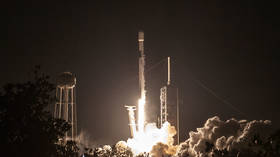Space X launches lander to Moon (VIDEO)

US private space technology company Space X has launched a rocket with a lunar lander on board. The lander, which embarked on its journey on Wednesday, is projected to deliver NASA instruments to the Moon in about eight days as the American space agency strives to eventually take humans back to the lunar surface.
The lander, named Athena and produced by Texas-based Intuitive Machines, caught a lift with a SpaceX Falcon 9 rocket launched from NASA’s Kennedy Space Center in Florida at 7:17 p.m. local time.
Its destination is Mons Mouton, a plateau near the South Pole of the Moon, the space agency said in a statement, adding that it is “closer to the pole than any preceding lunar mission.”
The Athena lander is carrying millions of dollars’ worth of NASA instruments that will be used for extracting lunar soil samples and marking locations of interest.
The launch was carried out as part of a NASA initiative that twice a year sends instruments to various geographic locations on the Moon using US private companies. The lunar delivery services are projected to broaden understanding of the lunar environment for potential manned missions to the Moon as part of the agency’s Artemis campaign.
The Moon is about to get a new visitor - and her name's Athena! On Feb 26 at 7:16pm ET, @Int_Machines' Athena lander lifted off on a @SpaceX Falcon 9 rocket from LC-39A. With @NASA payloads onboard, this flight is part of NASA’s Commercial Lunar Payload Services initiative and… pic.twitter.com/YXGgrlanTA
— NASA's Kennedy Space Center (@NASAKennedy) February 27, 2025
Launched in 2017, the Artemis mission is named after the Greek goddess of the Moon and twin sister of Apollo. The name was chosen as a tribute to the first Moon landing in 1969. The current mission aims to place the first woman on the lunar surface.
In December, the agency postponed the Artemis II and III missions aimed at sending astronauts back to the Moon until 2026 and 2027, citing technical issues. The missions stipulate that the Orion spacecraft will fly around the Moon first in automatic mode, and then with a crew on board, prior actually landing on the Moon.
The previous spacecraft, produced by Intuitive Machines, was launched in February 2024, but powered down a week after landing on the Moon. The uncrewed robot managed, however, to transmit images and other data to ground controllers during its weeklong stay on the lunar surface.













